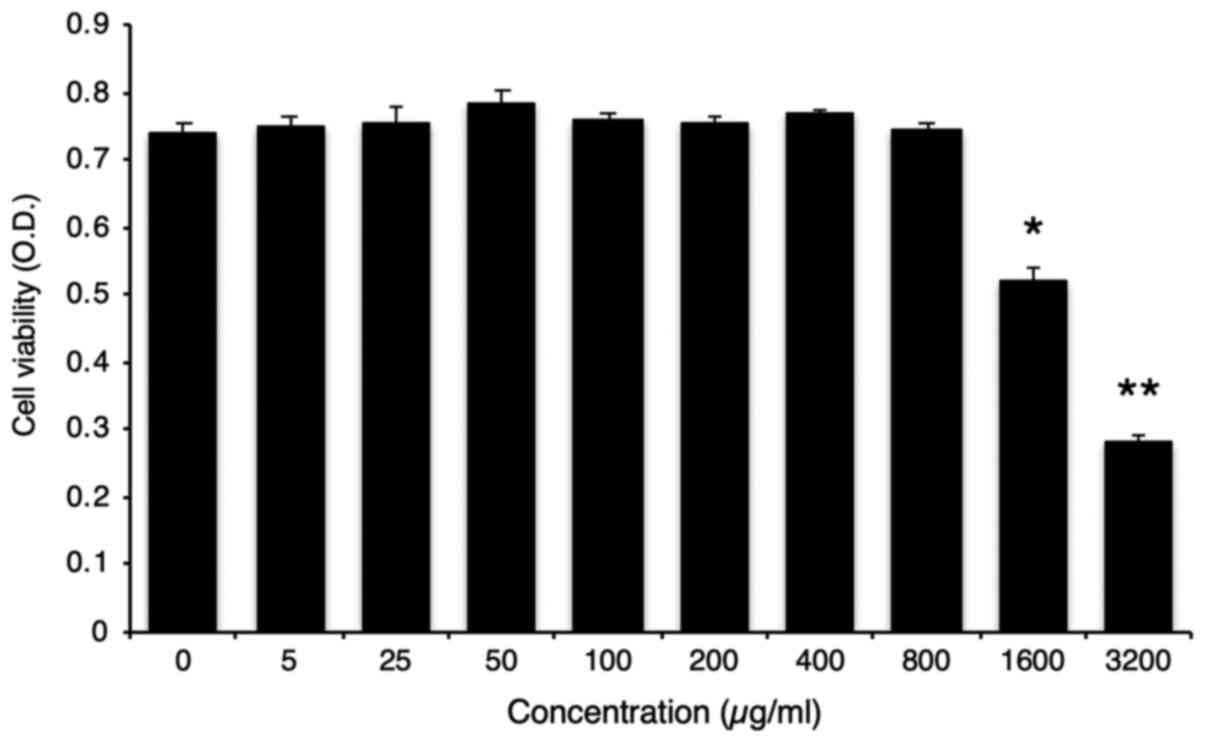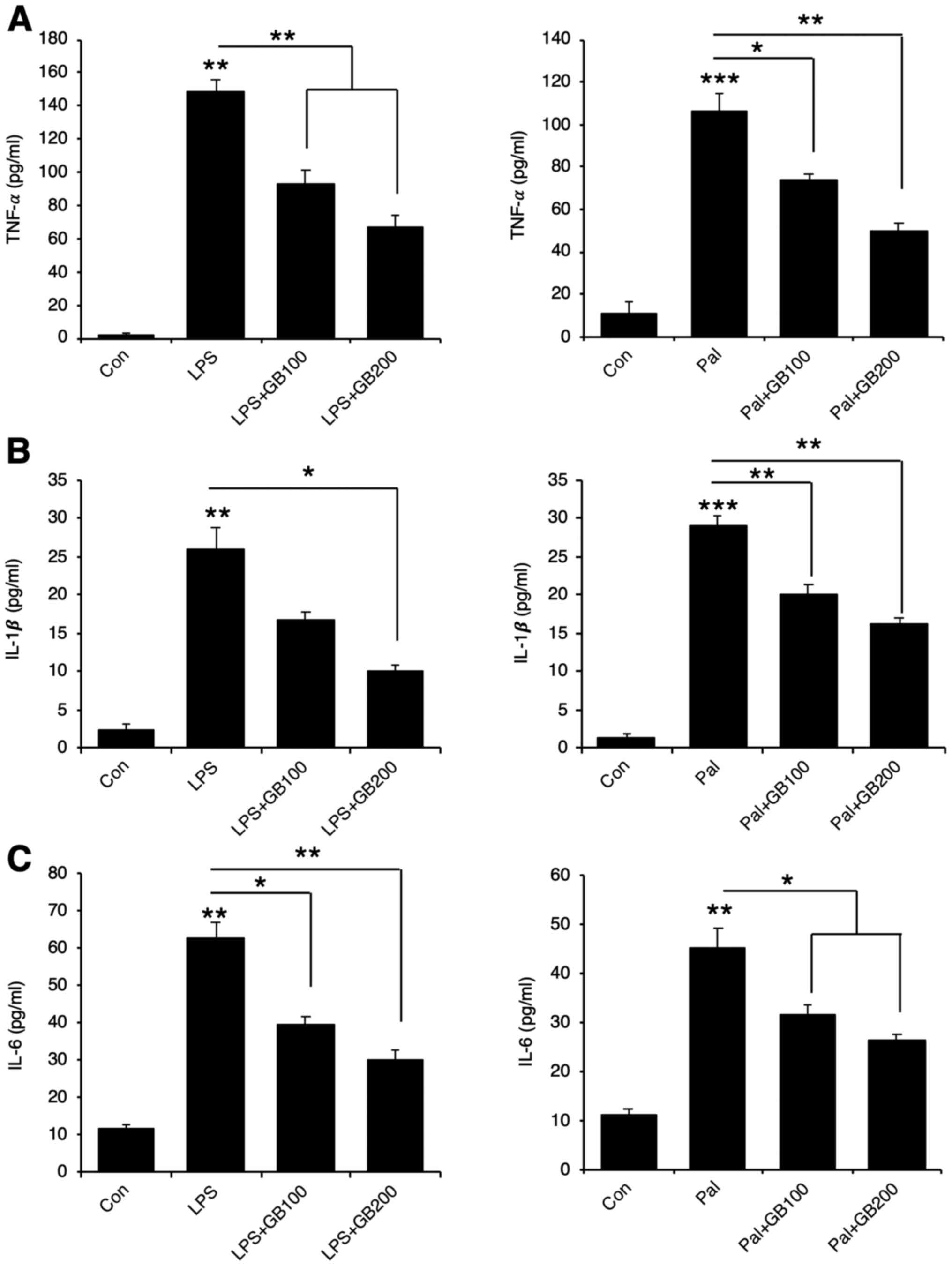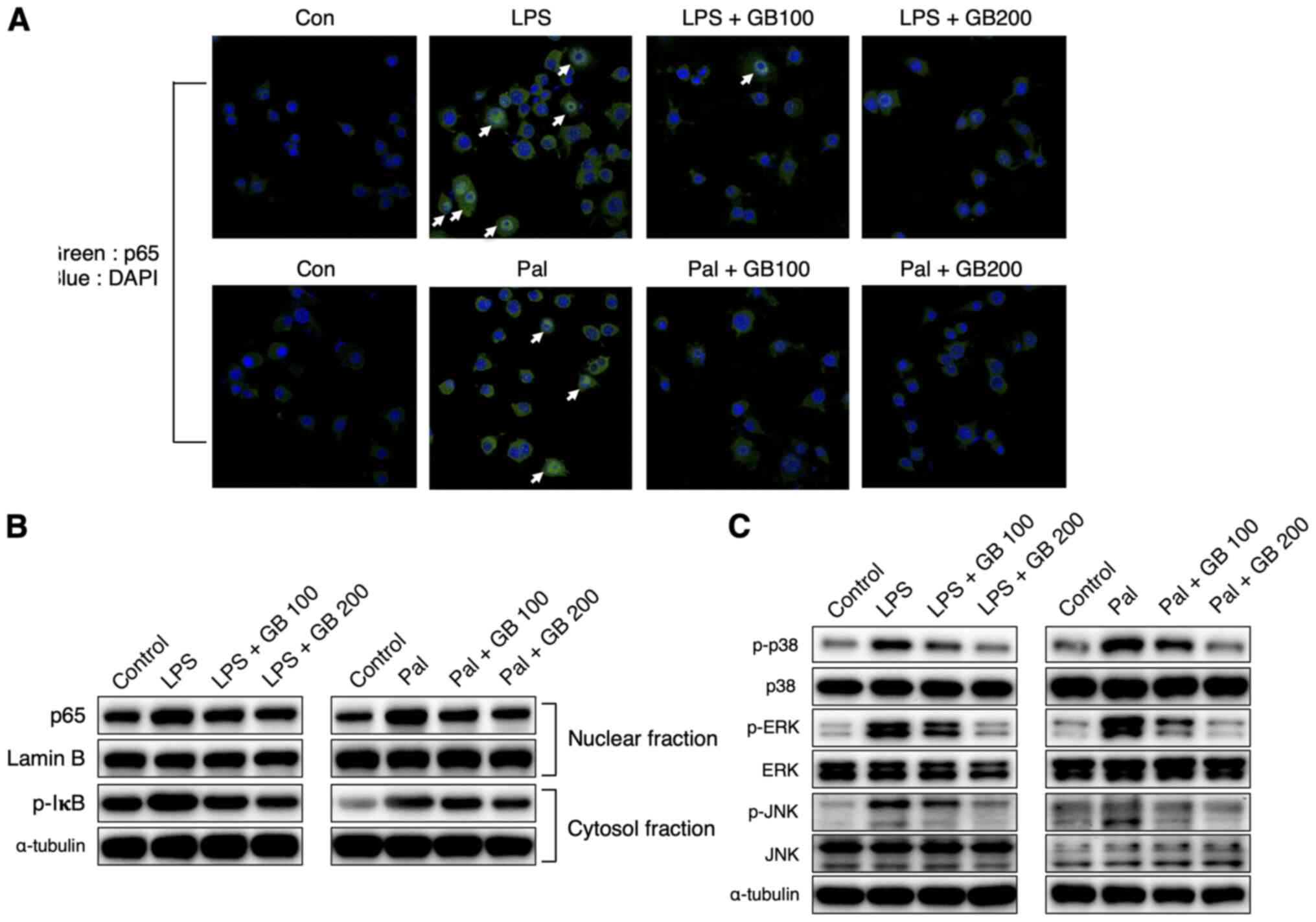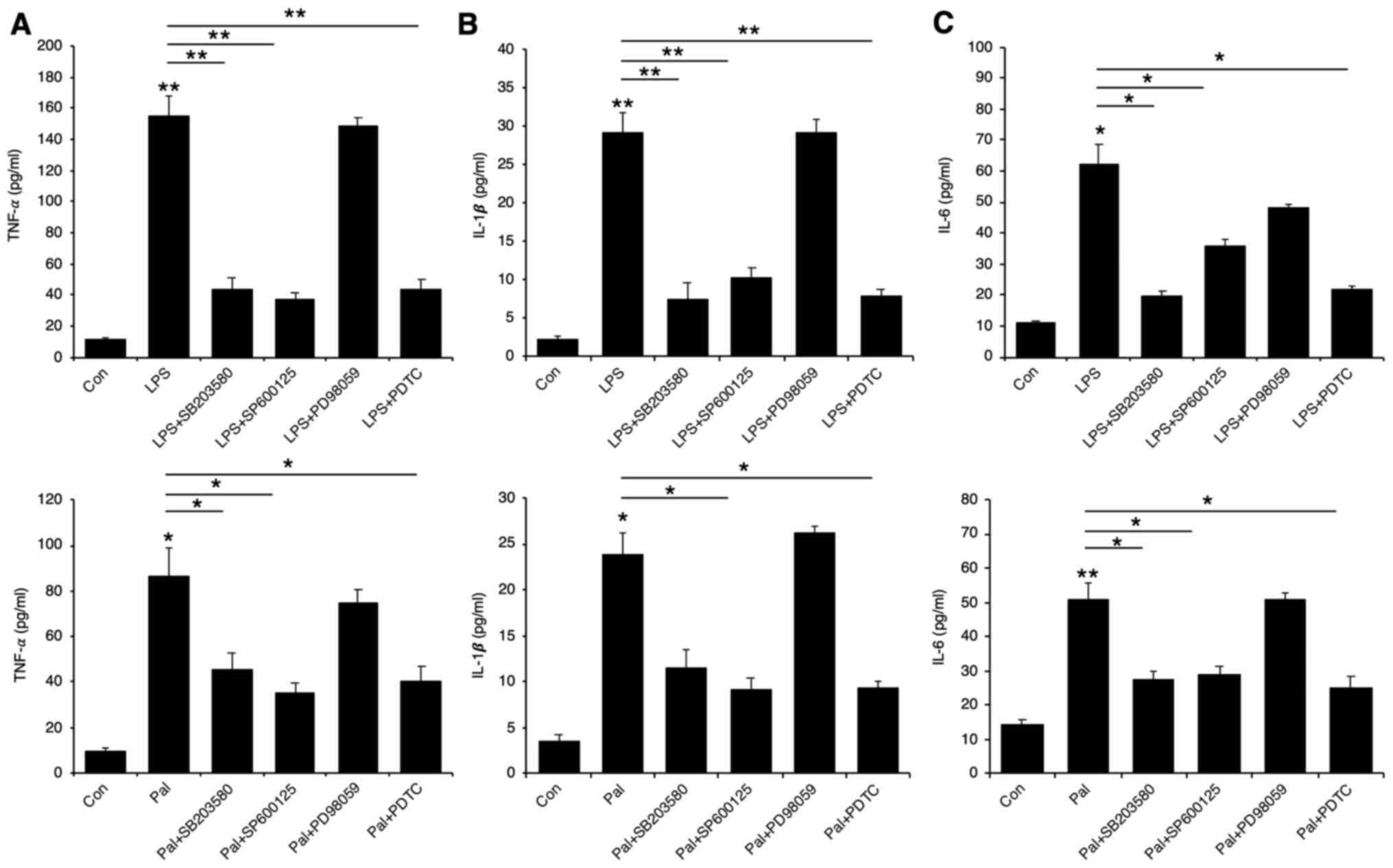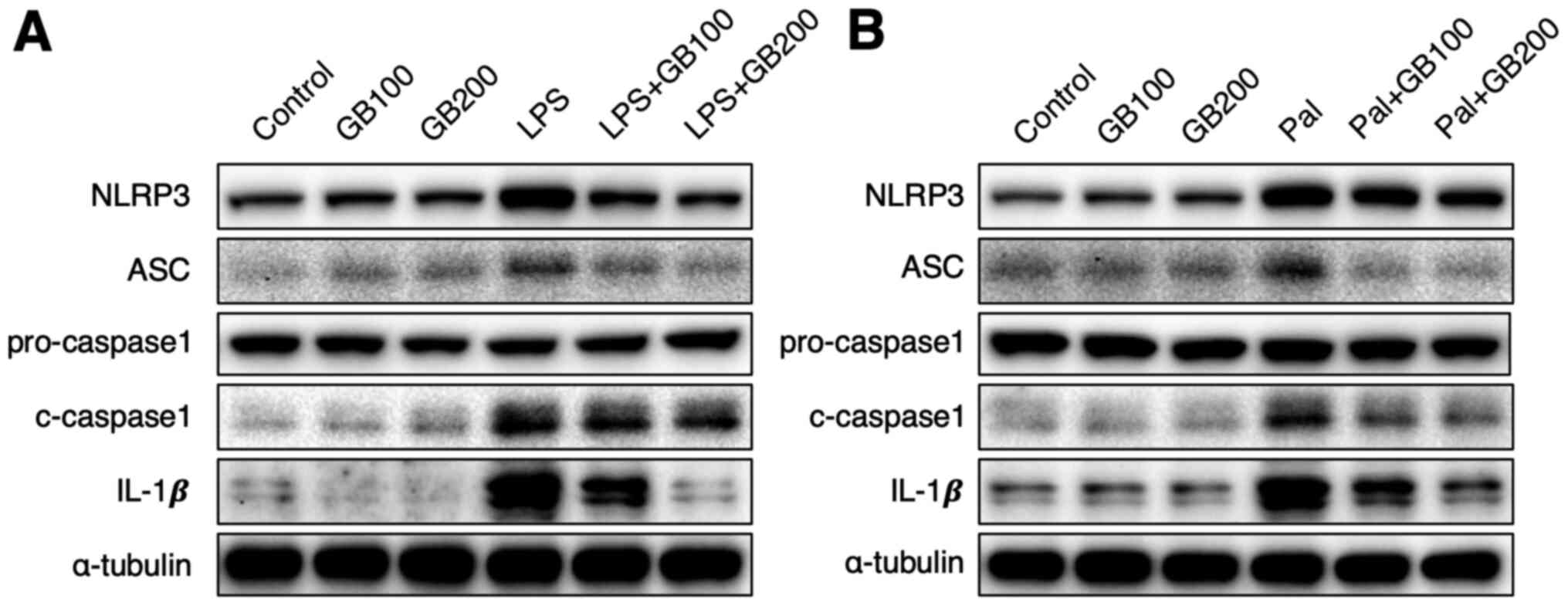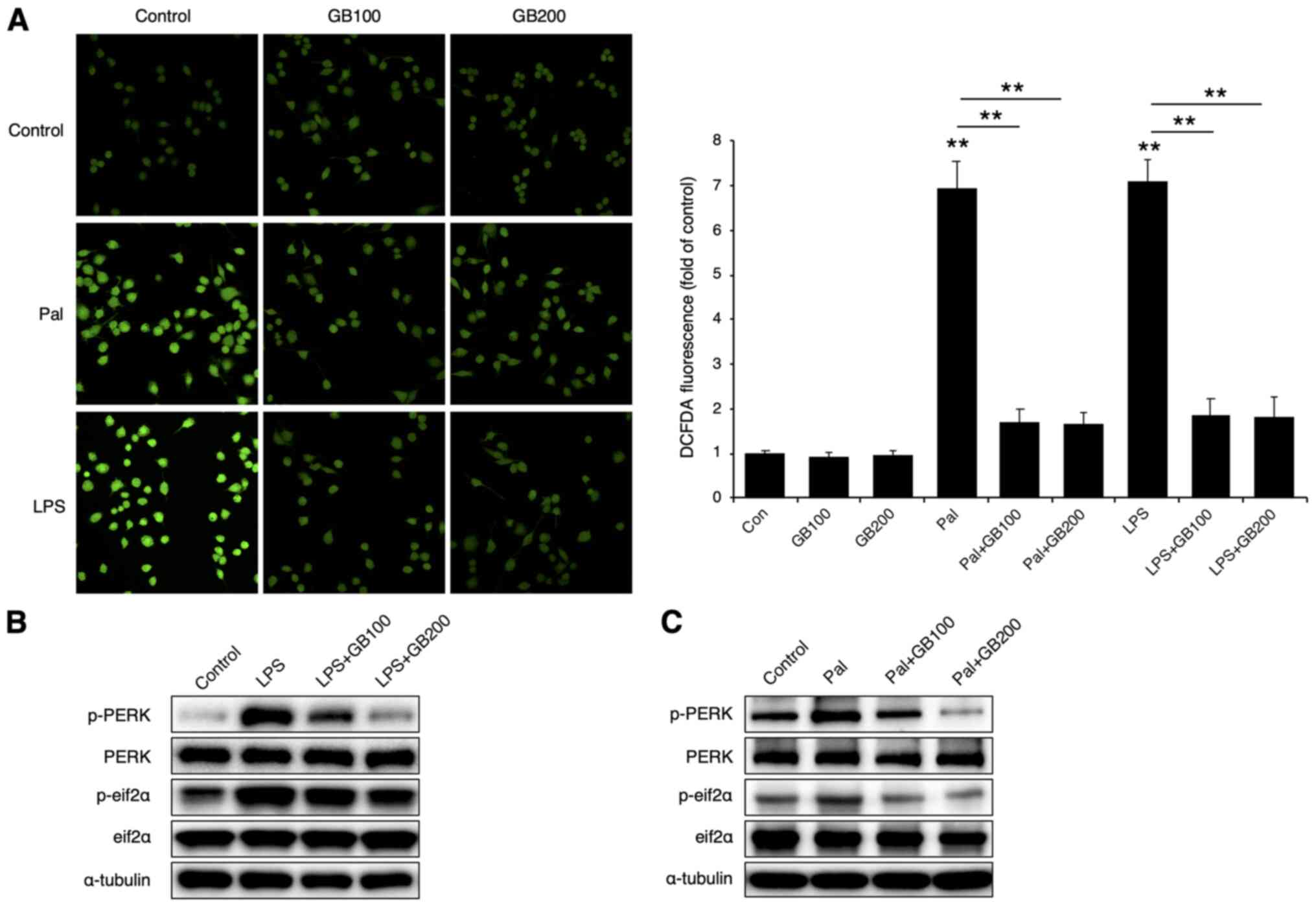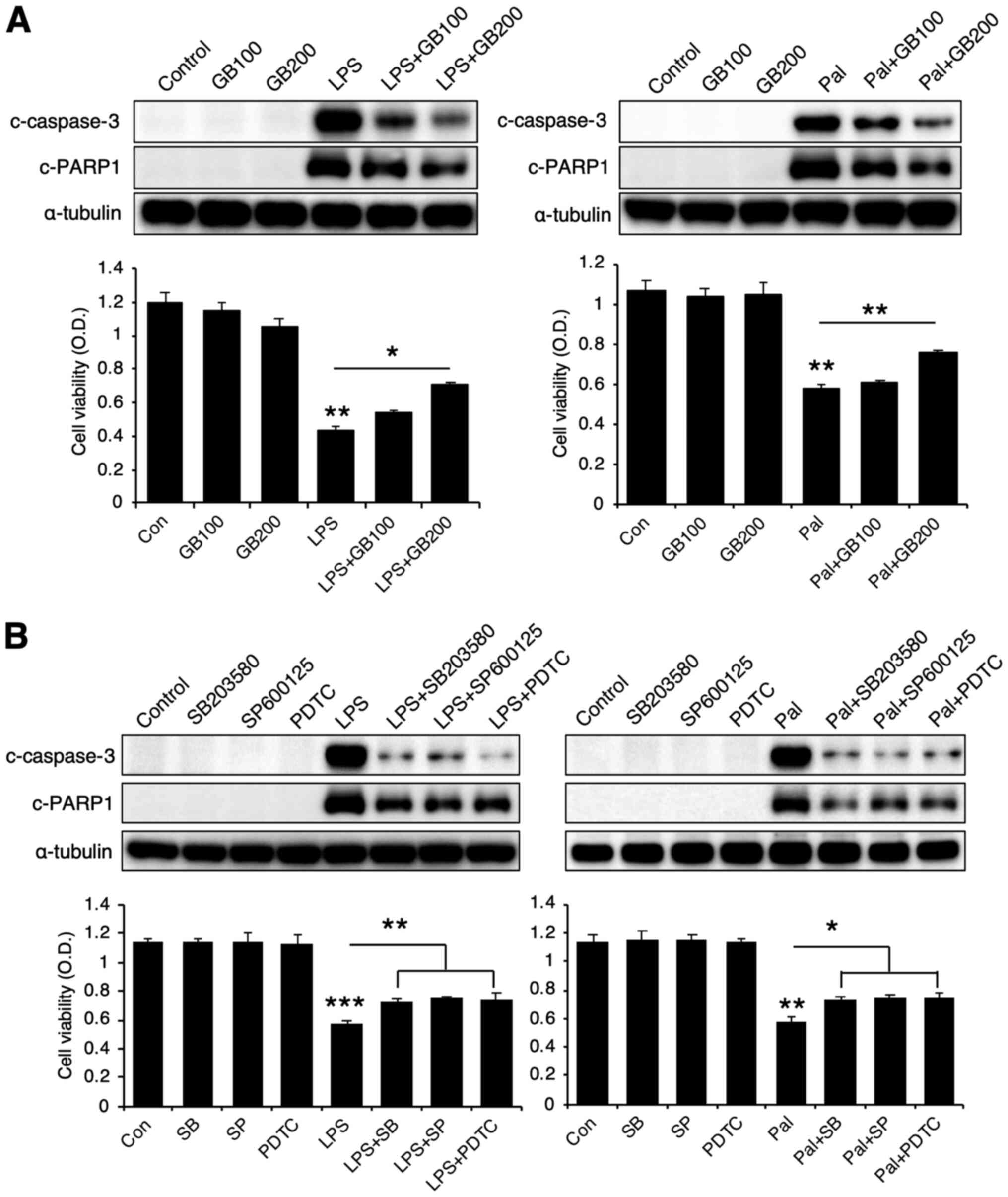|
1
|
Korbecki J and Bajdak-Rusinek K: The
effect of palmitic acid on inflammatory response in macrophages: An
overview of molecular mechanisms. Inflamm Res. 68:915–932. 2019.
View Article : Google Scholar : PubMed/NCBI
|
|
2
|
Lancaster GI, Langley KG, Berglund NA,
Kammoun HL, Reibe S, Estevez E, Weir J, Mellett NA, Pernes G,
Conway JR, et al: Evidence that TLR4 is not a receptor for
saturated fatty acids but mediates lipid-induced inflammation by
reprogramming macrophage metabolism. Cell Metab. 27:1096–1110.e5.
2018. View Article : Google Scholar : PubMed/NCBI
|
|
3
|
Shen C, Ma W, Ding L, Li S, Dou X and Song
Z: The TLR4-IRE1α pathway activation contributes to
palmitate-elicited lipotoxicity in hepatocytes. J Cell Mol Med.
22:3572–3581. 2018. View Article : Google Scholar : PubMed/NCBI
|
|
4
|
Yu W, Zhang X, Wu H, Zhou Q, Wang Z, Liu
R, Liu J, Wang X and Hai C: HO-1 is essential for
tetrahydroxystilbene glucoside mediated mitochondrial biogenesis
and anti-inflammation process in LPS-treated RAW264.7 macrophages.
Oxid Med Cell Longev. 2017:18185752017. View Article : Google Scholar : PubMed/NCBI
|
|
5
|
Rathinam VA, Vanaja SK and Fitzgerald KA:
Regulation of inflammasome signaling. Nat Immunol. 13:333–342.
2012. View
Article : Google Scholar : PubMed/NCBI
|
|
6
|
de Zoete MR, Palm NW, Zhu S and Flavell
RA: Inflammasomes. Cold Spring Harb Perspect Biol. 6:a0162872014.
View Article : Google Scholar : PubMed/NCBI
|
|
7
|
Baek HS, Min HJ, Hong VS, Kwon TK, Park
JW, Lee J and Kim S: Anti-inflammatory effects of the novel PIM
kinase inhibitor KMU-470 in RAW 264.7 cells through the
TLR4-NF-κB-NLRP3 pathway. Int J Mol Sci. 21:51382020. View Article : Google Scholar
|
|
8
|
Zhou H, Feng L, Xu F, Sun Y, Ma Y, Zhang
X, Liu H, Xu G, Wu X, Shen Y, et al: Berberine inhibits
palmitate-induced NLRP3 inflammasome activation by triggering
autophagy in macrophages: A new mechanism linking berberine to
insulin resistance improvement. Biomed Pharmacother. 89:864–874.
2017. View Article : Google Scholar : PubMed/NCBI
|
|
9
|
Wickliffe KE, Leppla SH and Moayeri M:
Anthrax lethal toxin-induced inflammasome formation and caspase-1
activation are late events dependent on ion fluxes and the
proteasome. Cell Microbiol. 10:332–343. 2008.PubMed/NCBI
|
|
10
|
Peng Y, French BA, Tillman B, Morgan TR
and French SW: The inflammasome in alcoholic hepatitis: Its
relationship with Mallory-Denk body formation. Exp Mol Pathol.
97:305–313. 2014. View Article : Google Scholar : PubMed/NCBI
|
|
11
|
Woolbright BL and Jaeschke H: Role of the
inflammasome in acetaminophen-induced liver injury and acute liver
failure. J Hepatol. 66:836–848. 2017. View Article : Google Scholar : PubMed/NCBI
|
|
12
|
Zhang L, Xu C, Chen X, Shi Q, Su W and
Zhao H: SOCS-1 Suppresses inflammation through inhibition of NALP3
inflammasome formation in smoke inhalation-induced acute lung
injury. Inflammation. 41:1557–1567. 2018. View Article : Google Scholar : PubMed/NCBI
|
|
13
|
Moossavi M, Parsamanesh N, Bahrami A,
Atkin SL and Sahebkar A: Role of the NLRP3 inflammasome in cancer.
Mol Cancer. 17:1582018. View Article : Google Scholar : PubMed/NCBI
|
|
14
|
Ahn MY, Han JW, Hwang JS, Yun EY and Lee
BM: Anti-inflammatory effect of glycosaminoglycan derived from
Gryllus bimaculatus (a type of cricket, insect) on
adjuvant-treated chronic arthritis rat model. J Toxicol Environ
Health A. 77:1332–1345. 2014. View Article : Google Scholar : PubMed/NCBI
|
|
15
|
Hwang BB, Chang MH, Lee JH, Heo W, Kim JK,
Pan JH, Kim YJ and Kim JH: The edible insect Gryllus
bimaculatus protects against gut-derived inflammatory responses
and liver damage in mice after acute alcohol exposure. Nutrients.
11:8572019. View Article : Google Scholar
|
|
16
|
Park SA, Lee GH, Lee HY, Hoang TH and Chae
HJ: Glucose-lowering effect of Gryllus bimaculatus powder on
streptozotocin-induced diabetes through the AKT/mTOR pathway. Food
Sci Nutr. 8:402–409. 2019. View Article : Google Scholar : PubMed/NCBI
|
|
17
|
Garcés R and Mancha M: One-step lipid
extraction and fatty acid methyl esters preparation from fresh
plant tissues. Anal Biochem. 211:139–143. 1993. View Article : Google Scholar : PubMed/NCBI
|
|
18
|
Ajuwon KM and Spurlock ME: Palmitate
activates the NF-kappaB transcription factor and induces IL-6 and
TNFalpha expression in 3T3-L1 adipocytes. J Nutr. 135:1841–1846.
2005. View Article : Google Scholar : PubMed/NCBI
|
|
19
|
Yoon J, Um HN, Jang J, Bae YA, Park WJ,
Kim HJ, Yoon MS, Chung IY and Jung Y: Eosinophil activation by
Toll-like receptor 4 ligands regulates macrophage polarization.
Front Cell Dev Biol. 7:3292019. View Article : Google Scholar : PubMed/NCBI
|
|
20
|
Wehinger S, Ortiz R, Díaz MI, Aguirre A,
Valenzuela M, Llanos P, Mc Master C, Leyton L and Quest AF:
Phosphorylation of caveolin-1 on tyrosine-14 induced by ROS
enhances palmitate-induced death of beta-pancreatic cells. Biochim
Biophys Acta. 1852:693–708. 2015. View Article : Google Scholar : PubMed/NCBI
|
|
21
|
Vogel SN, Marshall ST and Rosenstreich DL:
Analysis of the effects of lipopolysaccharide on macrophages:
Differential phagocytic responses of C3H/HeN and C3H/HeJ
macrophages in vitro. Infect Immun. 25:328–336. 1979. View Article : Google Scholar : PubMed/NCBI
|
|
22
|
Kim MH, Ahn HK, Lee EJ, Kim SJ, Kim YR,
Park JW and Park WJ: Hepatic inflammatory cytokine production can
be regulated by modulating sphingomyelinase and ceramide synthase
6. Int J Mol Med. 39:453–462. 2017. View Article : Google Scholar : PubMed/NCBI
|
|
23
|
Oh AR, Sohn S, Lee J, Park JM, Nam KT,
Hahm KB, Kim YB, Lee HJ and Cha JY: ChREBP deficiency leads to
diarrhea-predominant irritable bowel syndrome. Metabolism.
85:286–297. 2018. View Article : Google Scholar : PubMed/NCBI
|
|
24
|
Livak KJ and Schmittgen TD: Analysis of
relative gene expression data using real-time quantitative PCR and
the 2(-Delta Delta C(T)) method. Methods. 25:402–408. 2001.
View Article : Google Scholar : PubMed/NCBI
|
|
25
|
Morgan DM: Tetrazolium (MTT) assay for
cellular viability and activity. Methods Mol Biol. 79:179–183.
1998.PubMed/NCBI
|
|
26
|
Tang S, Shen XY, Huang HQ, Xu SW, Yu Y,
Zhou CH, Chen SR, Le K, Wang YH and Liu PQ: Cryptotanshinone
suppressed inflammatory cytokines secretion in RAW264.7 macrophages
through inhibition of the NF-κB and MAPK signaling pathways.
Inflammation. 34:111–118. 2011. View Article : Google Scholar : PubMed/NCBI
|
|
27
|
Wang L, Chen Y, Li X and Zhang Y, Gulbins
E and Zhang Y: Enhancement of endothelial permeability by free
fatty acid through lysosomal cathepsin B-mediated Nlrp3
inflammasome activation. Oncotarget. 7:73229–73241. 2016.
View Article : Google Scholar : PubMed/NCBI
|
|
28
|
Yang HL, Lin SW, Lee CC, Lin KY, Liao CH,
Yang TY, Wang HM, Huang HC, Wu CR and Hseu YC: Induction of
Nrf2-mediated genes by Antrodia salmonea inhibits ROS
generation and inflammatory effects in
lipopolysaccharide-stimulated RAW264.7 macrophages. Food Funct.
6:230–241. 2015. View Article : Google Scholar : PubMed/NCBI
|
|
29
|
Wu X, Gao H, Hou Y, Yu J, Sun W, Wang Y
and Chen X, Feng Y, Xu QM and Chen X: Dihydronortanshinone, a
natural product, alleviates LPS-induced inflammatory response
through NF-κB, mitochondrial ROS, and MAPK pathways. Toxicol Appl
Pharmacol. 355:1–8. 2018. View Article : Google Scholar : PubMed/NCBI
|
|
30
|
Duarte S, Arango D, Parihar A, Hamel P,
Yasmeen R and Doseff AI: Apigenin protects endothelial cells from
lipopolysaccharide (LPS)-induced inflammation by decreasing
caspase-3 activation and modulating mitochondrial function. Int J
Mol Sci. 14:17664–17679. 2013. View Article : Google Scholar : PubMed/NCBI
|
|
31
|
Kim DH, Cho YM, Lee KH, Jeong SW and Kwon
OJ: Oleate protects macrophages from palmitate-induced apoptosis
through the downregulation of CD36 expression. Biochem Biophys Res
Commun. 488:477–482. 2017. View Article : Google Scholar : PubMed/NCBI
|
|
32
|
Liu X, Zeng X, Chen X, Luo R, Li L, Wang
C, Liu J, Cheng J, Lu Y and Chen Y: Oleic acid protects
insulin-secreting INS-1E cells against palmitic acid-induced
lipotoxicity along with an amelioration of ER stress. Endocrine.
64:512–524. 2019. View Article : Google Scholar : PubMed/NCBI
|
|
33
|
Zhang Y, Dong L, Yang X, Shi H and Zhang
L: α-Linolenic acid prevents endoplasmic reticulum stress-mediated
apoptosis of stearic acid lipotoxicity on primary rat hepatocytes.
Lipids Health Dis. 10:812011. View Article : Google Scholar : PubMed/NCBI
|
|
34
|
Katsoulieris E, Mabley JG, Samai M, Green
IC and Chatterjee PK: alpha-Linolenic acid protects renal cells
against palmitic acid lipotoxicity via inhibition of endoplasmic
reticulum stress. Eur J Pharmacol. 623:107–112. 2009. View Article : Google Scholar : PubMed/NCBI
|
|
35
|
Yu Y, Correll PH and Vanden Heuvel JP:
Conjugated linoleic acid decreases production of pro-inflammatory
products in macrophages: Evidence for a PPAR gamma-dependent
mechanism. Biochim Biophys Acta. 1581:89–99. 2002. View Article : Google Scholar : PubMed/NCBI
|
|
36
|
Medeiros-de-Moraes IM,
Gonçalves-de-Albuquerque CF, Kurz AR, Oliveira FM, de Abreu VH,
Torres RC, Carvalho VF, Estato V, Bozza PT, Sperandio M, et al:
Omega-9 Oleic acid, the main compound of olive oil, mitigates
inflammation during experimental sepsis. Oxid Med Cell Longev.
2018:60534922018. View Article : Google Scholar : PubMed/NCBI
|
|
37
|
Cheng WL, Lii CK, Chen HW, Lin TH and Liu
KL: Contribution of conjugated linoleic acid to the suppression of
inflammatory responses through the regulation of the NF-kappaB
pathway. J Agric Food Chem. 52:71–78. 2004. View Article : Google Scholar : PubMed/NCBI
|
|
38
|
Harvey KA, Walker CL, Xu Z, Whitley P,
Pavlina TM, Hise M, Zaloga GP and Siddiqui RA: Oleic acid inhibits
stearic acid-induced inhibition of cell growth and pro-inflammatory
responses in human aortic endothelial cells. J Lipid Res.
51:3470–3480. 2010. View Article : Google Scholar : PubMed/NCBI
|
|
39
|
Lee JY, Im AR, Shim KS, Ji KY, Kim KM, Kim
YH and Chae S: Beneficial effects of insect extracts on
nonalcoholic fatty liver disease. J Med Food. 23:760–771. 2020.
View Article : Google Scholar : PubMed/NCBI
|
|
40
|
Son YJ, Choi SY, Hwang IK, Nho CW and Kim
SH: Could defatted Mealworm (Tenebrio molitor) and Mealworm
Oil Be Used as Food Ingredients? Foods. 9:402020. View Article : Google Scholar
|
|
41
|
Zielińska E, Baraniak B and Karaś M:
Antioxidant and Anti-inflammatory activities of hydrolysates and
peptide fractions obtained by enzymatic hydrolysis of selected
heat-treated edible insects. Nutrients. 9:9702017. View Article : Google Scholar
|















